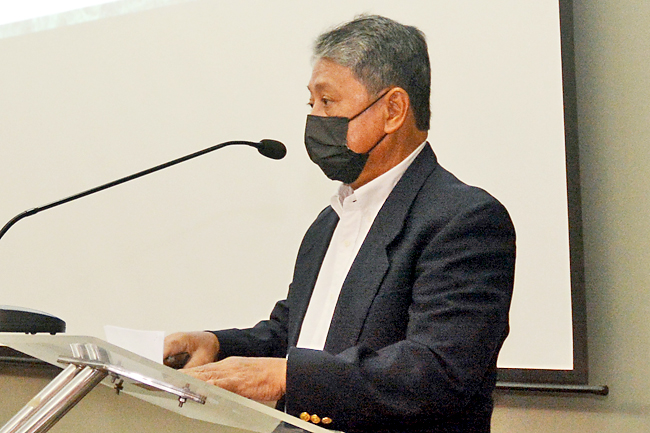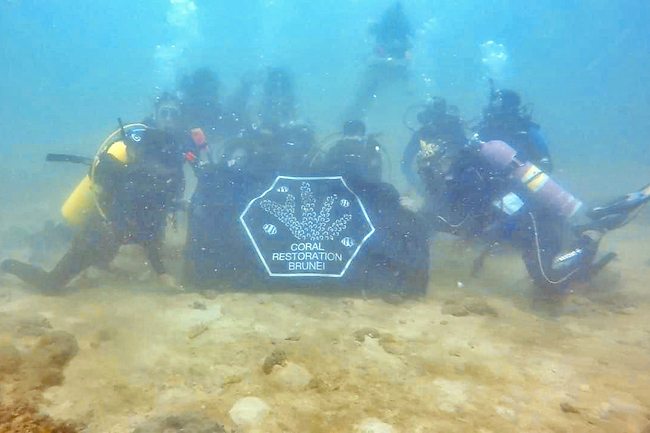James Kon
A call has been made for the Sultanate to establish marine parks to ensure the restoration and protection of marine life. This will also encourage research and studies to ensure continued breeding, which aligns with Section 26 (1)(b) of the Fisheries Order 2009.
Reef Check Brunei Chairman Pehin Orang Kaya Seri Utama Dato Seri Setia Haji Awang Yahya bin Begawan Mudim Dato Paduka Haji Bakar made the appeal during the World Oceans Day celebration at the Muara Fish Landing Complex on Saturday.
Organised by Reef Check Brunei, the celebration saw Permanent Secretary at the Ministry of Primary Resources and Tourism (MPRT) Hajah Tutiaty binti Haji Abdul Wahab attending as the guest of honour.
Stressing on the importance of marine life and the ocean, he said, “Brunei Darussalam is blessed with unpolluted open waters that can support the economic activities of the population.
“There are land locked countries located in busy waterways that are not afforded the privilege of enjoying the reefs, like the one we have here, which is the best. It is well conserved and diverse at a depth of four to 12 metres, located between four to 30 kilometres off the coast.”He also discussed Project Coral Restoration Brunei, a non-government organistation (NGO) initiative dedicated to conserving and restoring coral reefs, in line with the 14 United Nations Sustainable Development Goals (UN SDG) of ensuring the conservation of life underwater.
The project hopes to contribute to the network of coral reef within marine protected areas.


One of the highlights of the celebration was having Hajah Tutiaty attaching a string onto a frame to be deployed in the ocean to allow for coral growth.
Coral Reef Brunei (CRB) founder Frederick Chong said, “Our World Oceans Day celebration is about bringing together core players such as the Fisheries Department, Museums Department and local dive community. We would like to officiate the prolonged commitment to restore the reefs in Brunei waters.
“To date, 500 coral fragments (primarily staghorn corals) have been attached to metal frames. Weekly maintenance and monitoring occurs to allow the fragments the best chance of survival. Fragments are also measured so that growth data can be recorded and analysed. Initial observations are positive with fragments attaching to the structures and new growth visibly noticeable,” he added.
Oceanic Quest owner Steven Ng said, “We are happy to assist and have proactively fabricated the metal frame structures according to specifications from CRB Visual Media and Arts official Mark Rossow. We aim to maintain this close collaboration to highlight the importance of sustainable diving.”
CRB Marine Biologist Amanda Young said, “Coral reefs have been in rapid decline since the 1950’s; it is predicted that 70-90 per cent of coral species will be lost should temperatures continue to rise. Corals may seem tough as they have a skeleton made of limestone (rock), but it is in fact a living animal that has a fragile symbiotic relationship with an algae (zooxanthellae) that helps produce food for the organism.
“In times of stress, such as increased water temperature, sedimentation and increased algal blooms on reefs (all of which occur in Brunei), the algae become stressed and are expelled from the coral, which is referred to as coral bleaching. Should the stressors not return to previous levels, the coral will eventually starve and die.
“In the next stage of the project, the CRB team aims to trial alternative methodologies that have had successes from locations with similar conditions to that of Brunei, and to work with the fisheries to help conserve and restore Brunei Darussalam’s marine protected areas.
“This first year has been a learning journey. Primarily, we have learnt that what works for one area in the world may not be the best method for our waters. We have been reflective and adaptive in our approach, regularly fine-tuning our methods to best suit the needs of the coral.
“With this is mind, we intend to build genetically diverse coral nurseries next year, where corals will be nurtured and given time to grow before being transplanted to degraded reefs, where they will hopefully flourish and continue to grow into a healthy reef system,” Young added.
Meanwhile, CRB Social Media Manager Wendy Han said, “In the meantime, what we can do is give corals and the reef system a fighting chance – investing in education, restoration and enforcement so that we can turn the tide.”






